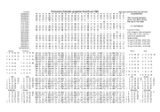
1582 Pope Gregory XIII announces the Gregorian calendar.
1582 Pope Gregory XIII implements the Gregorian Calendar. In Italy, Poland, Portugal, and Spain, October 4 of this year is followed directly by October 15.
1582 Because of the implementation of the Gregorian calendar this day does not exist in this year in Italy, Poland, Portugal and Spain.
1582 Because of the implementation of the Gregorian calendar, this day is skipped in Italy, Poland, Portugal and Spain.
1582 Because of the implementation of the Gregorian calendar, this day is skipped in Italy, Poland, Portugal and Spain.
1582 Because of the implementation of the Gregorian calendar this day does not exist in this year in Italy, Poland, Portugal and Spain.
1582 Because of the implementation of the Gregorian calendar, this day does not exist in this year in Italy, Poland, Portugal and Spain.
1582 Because of the implementation of the Gregorian calendar, this day does not exist in this year in Italy, Poland, Portugal and Spain.
1582 Because of the implementation of the Gregorian calendar this day does not exist in this year in Italy, Poland, Portugal and Spain.
1582 Because of the implementation of the Gregorian calendar, this day does not exist in this year in Italy, Poland, Portugal and Spain.
1582 Because of the implementation of the Gregorian calendar this day does not exist in this year in Italy, Poland, Portugal and Spain.
1582 Pope Gregory XIII implements the Gregorian calendar. In Italy, Poland, Portugal, and Spain, October 4 of this year is followed directly by October 15.
1690 Battle of the Boyne (Gregorian calendar) – The armies of William III defeat those of the former James II.
1700 Sweden introduces its own Swedish calendar, in an attempt to gradually merge into the Gregorian calendar, reverts to the Julian calendar on this date in 1712, and introduces the Gregorian Calendar on this date in 1753.
1700 Sweden introduces its own Swedish calendar, in an attempt to gradually merge into the Gregorian calendar, reverts to the Julian calendar on this date in 1712, and introduces the Gregorian Calendar on this date in 1753.
1752 Great Britain adopts the Gregorian calendar, nearly two centuries later than most of Western Europe.
1752 The British Empire adopts the Gregorian calendar, skipping eleven days (the previous day was September 2).
1753 In Sweden February 17 is followed by March 1 as the country moves from the Julian calendar to the Gregorian calendar.
1873 Japan begins using the Gregorian calendar.
1912 The Republic of China adopts the Gregorian calendar.
1918 The Gregorian calendar introduced in Russia by decree of the Council of People's Commissars effective from February 14(NS)
1918 Russia adopts the Gregorian Calendar.
1918 The Soviet Union adopts the Gregorian calendar (on 1 February according to the Julian calendar).
1925 Turkey adopts the Gregorian Calendar.
1927 Turkey adopts the Gregorian calendar: December 18, 1926 (Julian), is immediately followed by January 1, 1927 (Gregorian).

